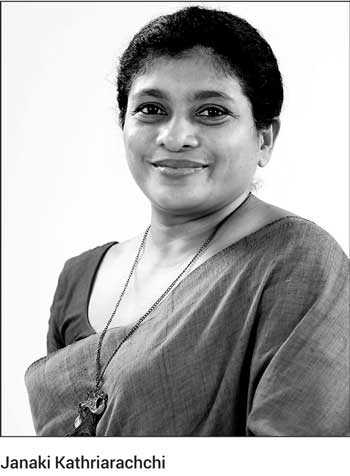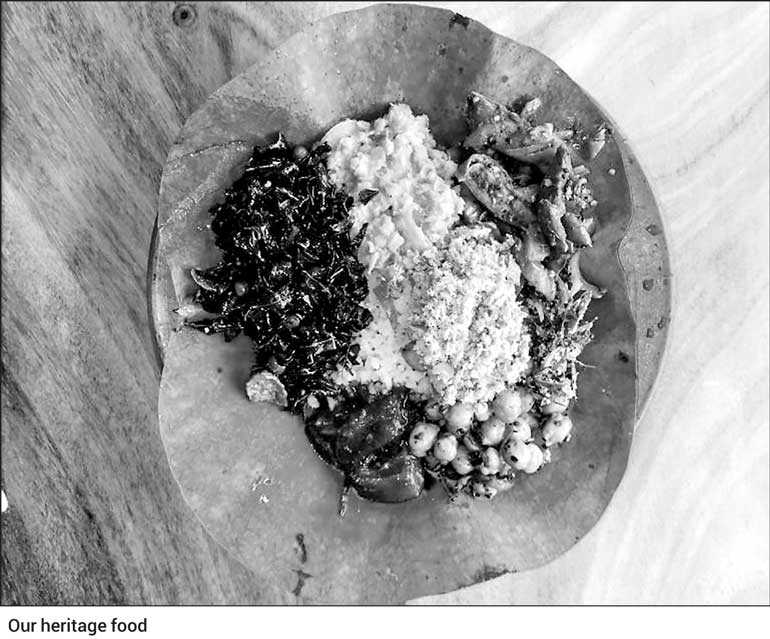Friday Feb 27, 2026
Friday Feb 27, 2026
Saturday, 5 October 2019 00:10 - - {{hitsCtrl.values.hits}}
Arōgyā paramā lābhā
santutthi paramam dhanan
vissāsa paramā nāthi
Nibbānan paramam sukhan
Health is the ultimate profit
Happiness is the ultimate wealth
A trusted friend is the best relative
Nibbana is the ultimate bliss
(Dhammapada verse)
 Food is what sustains us. Food of a particular country can also be called part of its heritage as what constitutes the diet of a nation is what grows in a particular land. In places such as Sri Lanka, our ancestral history and who we were as a people are known to have been strongly associated with the bounty of our land, where different crops were grown in different areas according to soil propensity and large irrigation schemes initiated for the support of agriculture.
Food is what sustains us. Food of a particular country can also be called part of its heritage as what constitutes the diet of a nation is what grows in a particular land. In places such as Sri Lanka, our ancestral history and who we were as a people are known to have been strongly associated with the bounty of our land, where different crops were grown in different areas according to soil propensity and large irrigation schemes initiated for the support of agriculture.
The Northern, Eastern, Central and Southern Provinces of the country are known to grow different crops, which make up the whole of our unique and varied diet, grown historically through traditional methods, without pesticide and known to have immense medicinal properties. Unfortunately, we today are hardly aware of our rich food heritage.
For example, we are ignorant of the many indigenous rice varieties and their historical link, such as the kalu heeneti rice variety, which were among the diet of the soldiers of the kings as it is known to increase vigour and boost the immune system as well as being part of curative treatments for many health issues.
Chasing after purported modern ‘foods’ of international food chains, which are totally alien to our culture or history, and have absolutely zero health benefits but amply add to the living of an un-harmonious life and doctor’s bills, we have forgotten the produce of the land of our birth. Admiring the ancient monuments constructed during the time of our kings we today wonder what happened to us today as a nation. We have forgotten that food makes up our genetic identity and determines the quality of our life and abilities.
In the following interview, Janaki Kathriarachchi, the founder and Managing Director of Ranbath Organic Food and Catering Services Ltd., shares her views on the link between entrepreneurship, national identity, history, health and food:
Q: Is it possible to grow organic food and still cater to a large population?
A: Yes. We were and still are an agrarian country. Unfortunately we have now been poisoned with the thought that pesticides and artificial fertilisers are absolutely needed to feed large numbers of people. This is an absolute myth. We have ruined our nation’s soil and killed off the eco system that worked together beautifully to see that the food we eat is grown as part of nature’s decree.
For example, when there were worms there was a particular type of bird to eat the worms, etc. Today we unthinkingly and unnecessarily use pesticides in very large quantities and we have been brainwashed to think that one cannot have profitable cultivation without artificial fertiliser. However, there still are many farmers in Sri Lanka who do cultivate in a large-scale manner resorting to organic methods used historically in this country. Our traditional grains such as mineri, kollu and olu seeds are still grown without any pesticide or fertiliser.
Q: You have won many awards for your mission of propagating heritage health foods of Sri Lanka through your restaurant chain Ranbath which operates in Battaramulla and Thunmulla. Could you speak of how you started your business and your achievements?
A: I started my business 20 years ago, by introducing an innovative product of washed cleaned and cut green leaves (gotukola, mukunuwenna, sarana, etc.) to the market. It began not with wanting to do a business as such, but wanting to feed a leafy diet to my children and coming up with an easy way of doing it and then branching it off as a mission for others to benefit, especially considering that many mothers are also juggling office work. That was in 1998.
I began working with farmer societies and cultivating using 100% natural methods and making our own fully organic fertiliser. We had received the Netherland Control Union certificate and SriCert Organic certification asserting that that our fields are organic. In the year of 2013 we started the first Ranbath restaurant in Battaramulla and last year the new branch in Thunmulla in Havelock Road was opened as the first-ever 100% vegetarian Sri Lankan organic restaurant and is located at part of the premises of the Buddhist Cultural Centre and also serve many organic fruit juices and soups.
We have won many prestigious awards such as Sri Lankan Entrepreneur National Woman Entrepreneur Gold award, National Business Excellence Gold award, Slim Brand Excellence SME Brand of the Year award, CNCI Achiever of Industrial Excellence award, NEDA Best Environmentally Friendly Enterprise award and many more.
The biggest achievement I feel is seeing how our customers become more and more aware of the value of the organic food and heirloom rice we serve at our restaurants and the contribution we make to make our nation a healthy one.
Q: Your restaurant in Thunmulla is vegetarian. Could you speak of our traditional Sri Lankan food and vegetarianism?
A: Most of our authentic Sri Lankan food is anyway vegetarian. Vegetarianism is becoming very popular as people are today keen to be vegan or vegetarian for many reasons such as for the good of the planet or their health or because their choice is a non-violent diet. We have also noticed the enthusiasm of non-vegetarian people who patronise our vegetarian restaurant who have first come to the restaurant only because they wanted to find out if one can actually eat without meat!
The main reason that makes anyone not miss a meat item in the meal is the unique taste in our vegetarian food that comes from the traditional spices, natural coconut milk and other organic natural ingredients we use in our food. We have found in conversing with our customers that there is a great need for education on the link between food and health, because what most of the people eat today as food is nothing but what has languished in ships for months from other countries and canned or stuffed into plastic.
Q: Could you elaborate on the rice varieties served?
A: The rice varieties served at our restaurants are traditional organic heirloom varieties such as pachchaperumal, kalu heeneti, kuruluthuda and suwandel. These heirloom rice varieties are grown by farmers who have knowledge and expertise in organic and bio dynamic farming methods that come from their ancestors.

Q: What is your advice to youth who want to start entrepreneurship ventures?
A: Keep your country and people in mind. Always do something that you can look back and be honestly happy about. Do not start initiatives that will poison your people and poison the earth and planet. What made me start the restaurants focusing on Sri Lanka’s authentic heritage food was the knowledge I had of my traditional food through my mother’s cooking.
If my mother brought me up on a diet of fast food or some instant packaged food, I too would have known only that taste. Today we feed absolute rubbish to our children and expect them to have good brain power. The ancient people of this country were exceptionally strong. The reason was because the diet they followed was very different to ours today.
Q: How popular is vegetarian food among Sri Lankan Tamils and Muslims?
A: I would say very popular. There are so many Tamil and Muslim families that come to Ranbath. Those who have spoken with me have expressed how thankful they are to have a place that serves vegetarian Sri Lankan food when all the places they have to go for vegetarian food are Indian places. Also in recognition of the service by Ranbath I was honoured by the Ministry of Women’s Affairs Jaffna with the Best Inspirational Woman Entrepreneur of the Year award.
Q: You only use clay water pitchers and coconut shells for the drinking of water?
A: Yes, because this is how we drank water in ancient Sri Lanka. Clay purifies water and water held in coconut shells is known to have many health benefits to the human body. We are trying to bring back the good things that our ancestors used.
Q: You also do not use any lunch sheet or plastic?
A: No. We use lotus leaf laid over the clay plates to serve the food. We serve our deserts also in small clay vessels as well as coconut shells.
Q: If you were to sum up the overarching philosophical inspiration for your work what would it be?
A: The Buddhist philosophy that decrees that health is the ultimate profit. Arōgyā paramā lābhā. Today we are a nation of sick people. We actually ‘purchase’ diseases like cancer through our wrong choice of food and we then go and build large cancer hospitals. We have to go to our roots to find a lifestyle of ease and not dis-ease.
The main reason that makes anyone not miss a meat item in the meal is the unique taste in our vegetarian food that comes from the traditional spices, natural coconut milk and other organic natural ingredients we use in our food. We have found in conversing with our customers that there is a great need for education on the link between food and health, because what most of the people eat today as food is nothing but what has languished in ships for months from other countries and canned or stuffed into plastic
The rice varieties served at our restaurants are traditional organic heirloom varieties such as pachchaperumal, kalu heeneti, kuruluthuda and suwandel. These heirloom rice varieties are grown by farmers who have knowledge and expertise in organic and bio dynamic farming methods that come from their ancestors
Keep your country and people in mind. Always do something that you can look back and be honestly happy about. Do not start initiatives that will poison your people and poison the earth and planet. What made me start the restaurants focusing on Sri Lanka’s authentic heritage food was the knowledge I had of my traditional food through my mother’s cooking
Today we are a nation of sick people. We actually ‘purchase’ diseases like cancer through our wrong choice of food and we then go and build large cancer hospitals. We have to go to our roots to find a lifestyle of ease and not dis-ease